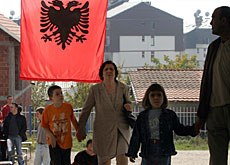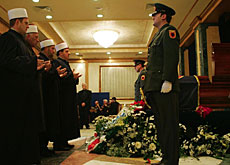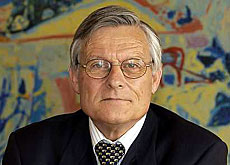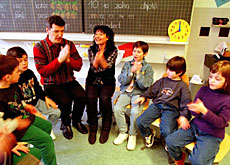Kosovo talks meet with mixed reactions

There have been varied reactions in Switzerland to talks on the future of the disputed province of Kosovo, which started in Vienna on Monday.
The United Nations-mediated meeting in Austria between Serbian and ethnic Albanian officials is expected to discuss more rights for Serbs and other minorities.
“It will be the first contact between parties,” said Thomas Fleiner, a Swiss legal expert who is advising the Serbian government’s team and who will be taking part in the discussions.
The meeting was delayed a month by the death of Kosovo’s president Ibrahim Rugova. It is the first time the two sides have met since UN envoy Martti Ahtisaari was appointed to broker a deal on the province last November.
Kosovo has been run by the UN since Nato drove out Serb forces in 1999 but its future remains unclear.
The majority ethnic Albanians want the province to gain full independence from Serbia, while Belgrade wishes to retain at least formal control over the troubled region.
Rights
However, for now both sides are expected to focus on local government reform and ensuring more rights for Serbs and other minorities.
Fleiner, who is head of the Federalism Institute at Fribourg University, said the meeting would cover questions on financing, education, justice and police, and minorities’ rights.
There are currently around 100,000 Serbs in Kosovo, which has a population of about two million people. The community is spread throughout the province.
More than 200,000 Serbs and other non-Albanians fled in the wake of the Kosovo war. Only around 14,000 are said to have returned.
This complex situation means that “a definitive and good solution for local government reform will need a lot of time,” said Fleiner.
Serbian officials said on Sunday that Serbs in Kosovo should be given self-rule in areas where they form a majority. These calls have been rejected in the past by ethnic Albanians.
Interest
The meeting, which will be attended by representatives from the United States, the European Union and Nato, is also being followed with interest by Switzerland, said foreign ministry spokesman Jean-Philippe Jeannerat.
This is due to the country’s close relations with the Balkan countries. There is a sizeable Balkan immigrant community in Switzerland.
Swiss Foreign Minister Micheline Calmy-Rey is one of the few western politicians to have publicly supported Kosovo’s demands for statehood. She has also stressed the need for a negotiated solution between all parties involved.
Representatives from the Serbian and Kosovo Albanian communities within Switzerland have reacted differently to the talks.
For Nefail Maliqi, a Kosovo Albanian journalist, the negotiations open the way towards independence.
But Slobodan Despot, former secretary of the Serbian Institute in Lausanne, cannot understand western attitudes to Kosovo. On the one hand, he says, an independent Kosovo is wanted, but Bosnian Serbs are not allowed their own state.
swissinfo, Andreas Keiser
Kosovo
Population: 1.9 million
Ethnic Albanians: 91%
Serbs: 5%
Other minorities: 4%
Unemployment rate: placed at 40%-80%
Poverty rate: around 50%
There are 370,000 immigrants from the former Yugoslavia in Switzerland, of which 36% are from Kosovo.
Since 1999 Switzerland has given around half a million Swiss francs in aid to the region.
The Swiss army has taken part in the Nato peacekeeping mission since the end of the war.
Kosovo is inside Serbia and Montenegro but has been administered by the UN since 1999.
UN-sponsored talks on Kosovo’s future got underway in November 2005 but negotiations were postponed after the death of President Rugova.
On Monday the first face-to-face talks between Belgrade and Pristina begin.

In compliance with the JTI standards
More: SWI swissinfo.ch certified by the Journalism Trust Initiative



You can find an overview of ongoing debates with our journalists here. Please join us!
If you want to start a conversation about a topic raised in this article or want to report factual errors, email us at english@swissinfo.ch.